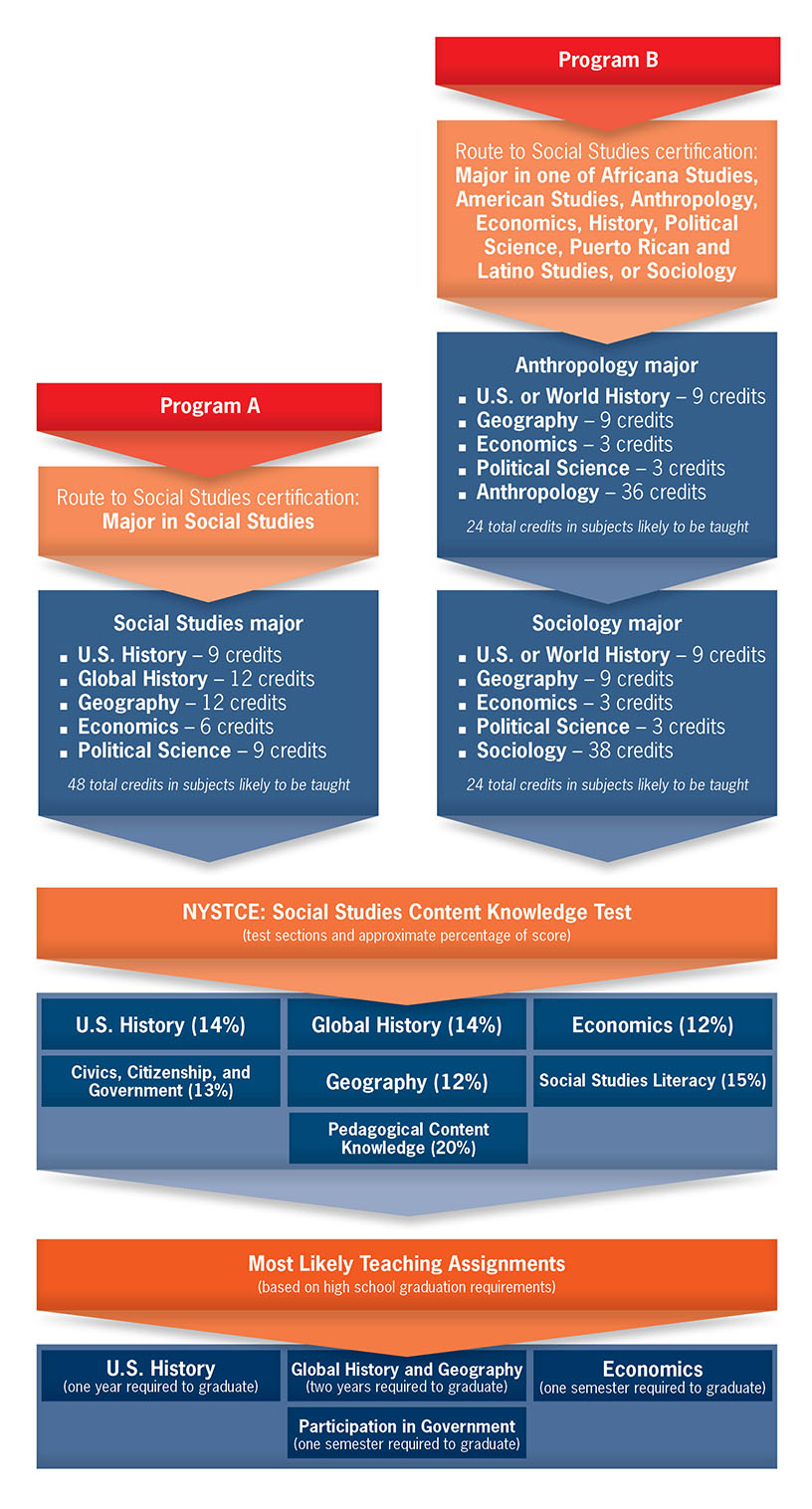This is the final installment in a series exploring secondary certifications, state licensing tests, and the subject matter preparation that teacher prep programs provide future high school teachers. Part one examined the two types of certifications and the courses that can be taught with each. Part two focused on the available science and social studies certifications across the country. Part three explored the content knowledge tests states typically require of new teachers. Now, this fourth installment looks at how teacher preparation programs can take different paths to prepare aspiring teachers within a given state context.
Secondary certification is a mess when looking across states; however, the picture should be clear for any given teacher prep program, which only needs to understand the structure of its state. One would assume the subject knowledge side of teacher preparation would be simple then – require aspiring teachers to take courses in the subjects on which they will be tested and will most likely teach. Yet here again we find confusion as programs within a given state prepare future teachers for the same certification with vastly different content coursework requirements.
To explore this, let’s look at two models for preparing social studies teachers in New York.
New York should be simple as it offers only a general Social Studies certification (allowing teachers to teach all of the individual social studies subjects). Through its high school graduation requirements, New York clearly specifies the courses social studies teachers are most likely to teach. The state requires all high school students to complete one year of U.S. history, two years of global history and geography, one semester of government, and one semester of economics – a total of four years worth of social studies coursework.
What’s more, New York has aligned its Social Studies content knowledge licensing test, which all new social studies teachers must pass, with these most likely teaching assignments. The test addresses each of the required high school subjects and does not cover additional social studies subjects like anthropology, psychology, or sociology.
So teacher prep programs know what content their graduates will need in order to pass the mandatory licensing test, which is conveniently in line with what those graduates will teach.
And yet, when looking at teacher prep programs in the state, we find a handful that seemingly disregard the core subjects their aspiring teachers are most likely to teach.
How is that possible?
Instead of providing a common sense plan of study that focuses on history, geography, economics, and government, these programs let aspiring teachers deeply concentrate on other subjects like anthropology, sociology, and Africana studies – all of which are perfectly legitimate majors, except in the context of preparing social studies teachers in New York.
As an example of how some of these single subject routes to Social Studies certification are structurally problematic, let’s consider actual examples from two public programs in New York – one which offers a single major logically aligned with the state requirements and one that allows candidates to pick their own path.

Not all eight potential majors for Program B are as problematic as anthropology and sociology. Still, those two majors best highlight the fact that even though an aspiring social studies teacher may complete 60 credits across the social sciences, in these majors they would complete only 24 credits in the subjects they are most likely to teach. Programs taking this “study what you want” approach are hard to understand. This is nothing short of negligence when preparing the individuals who will teach New York’s children. Requiring coursework to align with what will be taught is no more a violation of academic freedom than requiring Spanish teachers to learn Spanish.
And just to be clear, while we’ve leaned heavily on New York here, this same issue can be found in Colorado, Oregon, Pennsylvania, Washington, and Wisconsin, as well as at least seven other states.
Secondary certification is messy. Differences among states can be found when looking at what certifications are offered, what can be taught under each certification, and what licensing tests are required. Within the unique context of each state, secondary teacher prep programs must offer paths to certification, for which there is often no ideal design.
Yet, there is still common sense. Certainly, within a state, programs should be on the same page when it comes to the basics of what content aspiring teachers need to know. When sociology is not a subject high school social studies teachers are likely to teach, it doesn’t make a lot of sense for teacher prep programs to offer a sociology-focused route to certification.
New York has clearly taken the time to consider what social studies content should be covered in high school and has made further effort to align its content knowledge test with those subjects. It seems only logical that New York (and every other state) would take the last step to verify that teacher preparation programs actually prepare future teachers in the content they will be teaching.
When drivers’ tests require parallel parking to pass, all driver’s ed instructors teach their students how to parallel park. When the rules of basketball require players to dribble instead of carry the ball, coaches make sure their players learn how to dribble. So why, when a state requires the same content for both the test and for the job, don’t all teacher prep programs require aspiring teachers to learn this content?
More like this

Trained but sidelined: how schools are missing out on mid-career teachers

Good intentions, worrisome results: The impact of emergency teacher licensure in Massachusetts

Not so fast! Why emergency teacher licenses fall short


